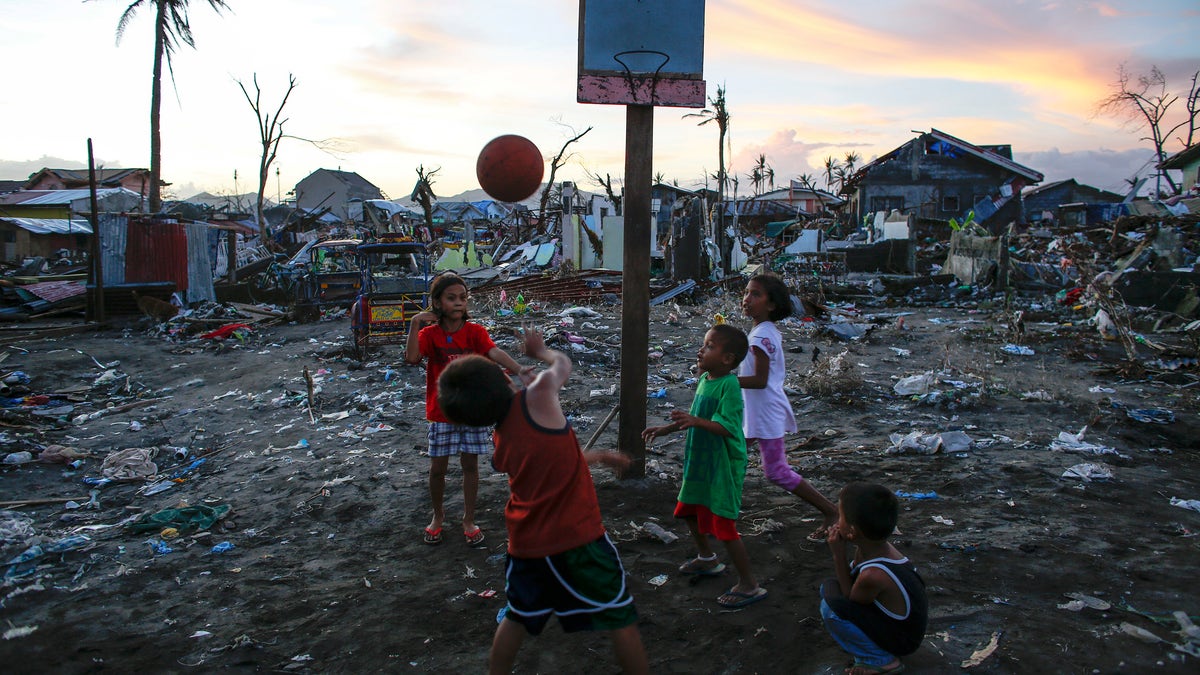
Children play basketball at an area devastated by Typhoon Haiyan in Tacloban city November 24, 2013. REUTERS/Athit Perawongmetha
His head bent as he plays with the red laces of his tattered sneakers, 13-year-old Joshua Villanueva haltingly recounts how he lost both his parents and two younger sisters last November.
Now living with elderly grandparents and a cousin who also lost a parent, Villanueva is one of dozens, possibly hundreds, of children orphaned by Typhoon Haiyan which killed or left missing some 7,000 people after ripping through the Philippines.
Haiyan, the strongest storm on record to ever hit land, struck Villanueva's coastal community with such ferocity on Nov. 8 last year that no trace remained of his former home.
His family's evacuation to a relative's home on higher ground the night before the storm did not prevent the tragedy.
"My father was holding me and my two sisters when a concrete block which was part of the wall hit his head," said Villanueva, a small boy with spiky hair who looks younger than his age.
The torrent of water separated the family. Villanueva said he survived by holding onto a coconut tree.
The bodies of his father and sisters were found the next day. It took a month before his mother was found.
"I was hoping she would still be alive because it took so long for her body to turn up," he said, not looking up.
UNICEF, the United Nations' children agency, said Haiyan affected 5.9 million children, yet it is unclear how many have been orphaned.
The Department for Social Welfare and Development (DSWD), UNICEF, and charity SOS Children's Villages International have differing figures for the number of separated and unaccompanied children varying from 111 to 132.
But aid workers say there are likely to be many more unregistered orphans as Haiyan destroyed the paper-based civil registration system and there is a lack of government social workers to conduct detailed assessments of children's needs.
The Thomson Reuters Foundation interviewed a dozen or so orphaned and abandoned children and their carers. Many said they received little or no support to help cope with the trauma after an initial flurry of counseling sessions. Almost all are living with extended families, usually grandparents.
UNICEF is providing some psychosocial support for traumatised youngsters but some children who do not seek out such counseling may still miss out. They're looking at bringing in psychiatrists and psychologists but they seemed not to have done it yet.
FAMILY TIES
Ninita Villanueva, 71, said she did not hesitate to take in her grandson Joshua and his cousin.
"It's Filipino custom to take in your kin if their parents passed away. I know of many who have done the same," she said while waiting at the Basey sports stadium for cash support from aid agency Terre des Hommes.
Aid workers say living with extended or even foster families brings a much-needed normalcy into the children's lives that would help them recover but it puts the burden on relatives.
Villanueva's grandmother, a farmer, said they are earning less from rice and coconut farming after Haiyan destroyed crops and facing higher expenses with two extra mouths to feed so her husband is trying to bridge the gap by doing manual labor.
Serapio and Asela Olabay Villegas are in the same predicament, looking after three sets of orphaned grandchildren - seven in total - with ages ranging from nine to 19.
"As a retired government employee, my husband's pension is about 6,000 pesos ($133) a month. But one sack of rice is 2,300 pesos ($51) and lasts only one week," she said.
Without support from SOS Children's Villages International, which provides each child between $50 and $65 a month, they would be in trouble, Villegas said.
The mental hardship is difficult to deal with. Villanueva and the Villegas grandchildren remain scared of thunderstorms.
Arvin Jay G. Cordeta, a social worker with the DSWD in Tacloban, one of the worst hit areas, said a major challenge in helping children deal with the trauma is a lack of qualified social workers and psychologists in the Philippines.
Lotta Sylwander, UNICEF's representative in the Philippines, said the impact of losing families to the typhoon would have a longterm physical, mental and developmental impact on children.
"(Young children) are taken away from home and everything they know that is safe and secure," she said.
"They could regress and stopped developing, unless they’re given really professional post-traumatic stress treatment or counselling."
